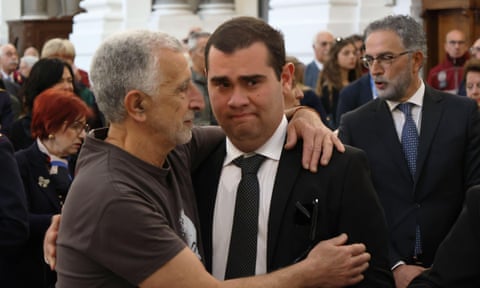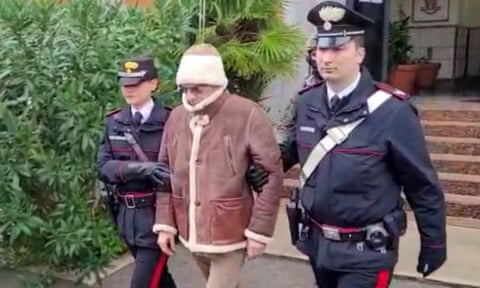Sicilian mafia victims’ families dread release of mobsters
Most of the bosses, released from prison on furlough or for good behaviour, have never disavowed Cosa Nostra.
Families of victims killed by the Sicilian mafia have expressed fears that more than 20 senior mobsters released over the last three months may now return to the neighbourhoods they once controlled.
The majority of these bosses, some of whom held leadership roles in the main mafia families of Sicily’s capital, Palermo, have never disavowed Cosa Nostra, the Sicilian mafia, and have always refused to cooperate with the judicial authorities. They have been released on furlough or for good behaviour.
Salvatore Borsellino, the brother of the legendary anti-mafia judge Paolo Borsellino, who was killed by the Cosa Nostra criminal organisation in 1992, said: “The release from prison of mobsters who have always refused to collaborate with justice is always extremely dangerous. It’s a fatal blow to the fight against the mafia.”
Nino Morana Agostino, the nephew of the police officer Nino Agostino, who was shot dead in broad daylight in 1989 along with his wife, Ida, who was five months pregnant, told the newspaper la Repubblica: “We cannot afford to lower our guard in the fight against the mafia or to underestimate it. The mafiosi who had been sentenced to life imprisonment and who are now returning to freedom with parole still hold heavy secrets on unsolved mafia murders that they have refused to confess. That’s why their release sends a bad signal.”

Nino Morana Agostino, nephew of Nino Agostino. Photograph: LaPresse/Alamy
In October, Raffaele Galatolo, 74, a mafia boss in the Acquasanta neighbourhood of Palermo, after the court declared him a “model detainee” for his good behaviour, has returned to freedom, with certain conditions. Galatolo and his brother Vincenzo, who were both convicted of murder, were the leaders of the so-called “death chamber”, a room where victims were strangled on the orders of the then boss of the Sicilian mafia, Salvatore “Totò” Riina. After Vincenzo’s death, Raffaele remained the sole heir to the throne in the mafia family of Acquasanta.
A week earlier, Giuseppe Corona, who had been in custody awaiting trial since 2018 at the maximum-security prison reserved for mafia bosses, was released, having served the maximum period allowed before his trial, which has been continually delayed.
At the beginning of October, the Palermo court of appeals had released nine bosses from Trapani for the same reason, linked to the former boss of the Sicilian mafia Matteo Messina Denaro, arrested in January 2023 after 30 years on the run, who died in September of the same year.

Matteo Messina Denaro the country’s most wanted mafia boss being escorted out of a Carabinieri police station after he was arrested in Palermo, Italy in 2023. A THIRD PARTY./File Photo Photograph: CARABINIERI/Reuters
The chief prosecutor of Palermo, Maurizio de Lucia, has recently issued an appeal to maintain focus on the fight against the mafia, with investigators fearing the possibility that Cosa Nostra, after a long period of decline, may try to reorganise the so-called Cupola, its governing body.
“This is a perfect storm,” said Federico Varese, a professor of criminology at the University of Oxford and the author of Mafia Life. “Recent changes in Italian law allow bosses who never recanted their past actions and never testified against the mafia to benefit from legislation for ‘good behaviour’. Prison authorities are not consulting prosecutors to get a sense of how dangerous their return might be, and simply grant them the benefit. Their return en masse will make it easier for Cosa Nostra to reorganise. It will be more likely that the Cupola will now be able to meet. Also, their presence sends a message of relative impunity to the community.”
The fear of prosecutors and the families of the victims is mainly due to the fact that many of these bosses have refused to cooperate with the authorities, signalling their interest in continuing to belong to the mafia.
“These mobsters will leave prison to reclaim their power within the clan,” said Borsellino. “Moreover, they will enjoy even more prestige among mafia members and those who support Cosa Nostra because they can boast of being in prison without ever speaking or naming other clan members.”
Varese said: “Entry into the Sicilian mafia is for life, and it happens through a ritual. At the ritual, the burning image of a saint is put in the hands of the novice and the assembled mafia members declare: ‘You will burn like this image if you betray or try to leave this organisation.’
“You can leave only with death or expulsion for becoming a state witness (death is indeed the punishment for those who become state witnesses). So it follows that those who come back to the neighbourhoods of Palermo and Trapani will resume their mafia activities.”
Read more similar news:
Comments:
comments powered by Disqus


































